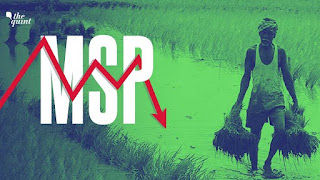
There is a mixed reaction in society about the ongoing farmers protest in Delhi. This article is an opinion edition on farm laws and farmers protest.
Agriculture reforms have started long back in 2003 when Shri Atal Bihari Vajpayee was our prime minister. Basically, agriculture has two problems, production and marketing. The laws that the Modi government has passed are related to marketing section.
In COVID period, our government has suspended APMC Act temporarily so that farmers can sell their produce in any part of the country. In this period, a total of 106 metric tonnes of wheat was produced in the country out of which the government procured 39 metric tonnes of wheat from farmers. This was the first time in India’s history to procure such a large portion. Around 70,000 crores of income was generated through such transactions. Even in such crisis, supply chains weren’t effected, farmers didn’t loose anything, no farmer sold their produce below Minimum Support Price (MSP). Govt observed that direct buying and selling of produce rather than Mandi and intermediaries were more effective. This made the government consider the timing of these laws. As one has said don’t waste the crisis. The government introduced these bills in parliament in September, got passed it in both houses and with President’s approval they became laws.
Why are farmers against these bills?
Farmers from states like Punjab and Haryana are against this bill. The main fear they express is that if these laws are implemented, there will be no guarantee on their minimum support price (MSP).
What the farmers have missed?
MSP is a notional figure. The problem is, with the MSP we have, the production and procurement is much above than FCI unloading. This is leading to stock piling. Even if these laws lead to moderation of MSP, it is in the interest of farmers so that they look for other ways in earning higher income.
The Point to be noted is that the law no where states that the existing MSP structure would be abolished. As per Shanthakumar panel report (a situational survey of farmers), around 90% of farmers sell their produce to private sector. It also stated that only 6% of farmers benefited from MSP even though it was in existence from 1965.
Due to such MSP, FCI on the other hand is buying stuff which is in excess of required. Value of excess stock holding of FCI is 1.80 lakh crore. FCI’s debt-equity is around 2 lakh crore to 5000 crore. In technical terms FCI is bankrupt. To change this equation, these laws are required.
Politics of Punjab State government and farmer associations.

Punjab gets huge part of its revenue through the cess and taxes imposed on produce the farmer brings to the mandi. In general Rural development cess and Mandi tax of 2% each are levied on the produce but in Punjab the rate is 3% each. The revenues it raises from Rural Development cess and Mandi tax is around 1700-1800 crores each. In addition, agents commission (2.5%) is charged. It’s not a small amount for such a small state. These funds are generally appropriated into different accounts like salaries etc. Now if these laws are implemented, the state would loose such a huge portion of income.
Also, this law gives importance to private sector, which will make farmers to produce a variety of crops rather than the same old wheat and rice cultivation. Punjab on the other hand has farmers cultivating rice and wheat in huge quantities. Punjab’s government as part of politics have made electricity and water rates cheaper (almost nil). This made the farmers to cultivate only rice and wheat as they were procured by state government at MSP. Almost 95% of produce brought to Mandis by Punjab farmers are bought by state government. No state in India does this.
Conclusion:
The government’s job is to explain the law and it has clearly failed in communicating it. Opposition on the other hand has used this opportunity to spread false narrative. In the end, I would say hear the policymakers not the political leaders because they are the one who know the facts.
– ANJAN KUMAR
(Opinion expressed by the author is his personal. The Generalist Insights take no responsibility of the opinion expressed.)

Comments